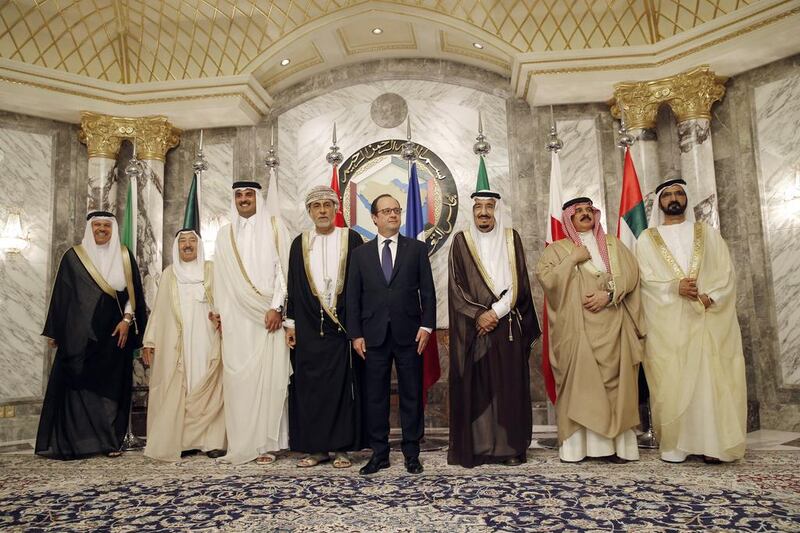France is enjoying a “honeymoon” in the Arabian Gulf with a visit to Qatar, to which it sold 24 Rafale fighter jets, followed by a visit to Saudi Arabia to attend the GCC Summit in Riyadh, noted Mohamed Krishan in Wednesday’s edition of the pan-Arab daily Al Quds Al Arabi.
Paris seized the right opportunity in the region to promote itself as a reliable ally, as opposed to the hesitant and undependable Washington, the writer said.
French president Francois Hollande said his country aimed at reaching a transition in Syria that excludes president Bashar Al Assad, but comprises all opposition groups as well as some individual components of the regime.
He also said that France had been an active player in the coalition that strikes terrorists in Iraq and that the country had been working hard to find a solution to Iran’s nuclear programme.
Mr Hollande had repeatedly hinted that France will never abandon its allies, even though questions have been raised over the US stance on several issues, including Iran’s nuclear programme, the writer remarked.
Despite US efforts at reassuring the GCC leaders over the nuclear deal with Iran – Barack Obama is expected to reiterate the US position during a Camp David meeting later this month – uncertainty prevails. So France knew when to throw its weight around and reintroduce itself as a traditional Gulf ally vis-à-vis the US.
The Iranian media was among the first to get the message when it said that the Gulf countries’ arms deals with France were meant to reward Paris for its role in the nuclear talks with Iran and mark a new chapter in the relations between France and the GCC.
Saudi commentators are also upbeat. Thus, Jamal Al Dhaibani noted that the GCC countries “are confident and have other reliable partners, thanks to the alliances formed post Operation Decisive Storm”. He added that when the US secretary of state arrived in Riyadh yesterday, he would have realised that the Gulf leaders expected real answers over the framework agreement with Iran. He said that Mr Obama’s policy has been inconsistent while France’s has been marked by “clarity”.
Writing for the London-based newspaper Al Hayat, Mohammad Barhouma said that president Hollande’s attendance at the Riyadh summit was a meaningful move and can be seen as a prelude to the GCC leaders’ meeting with president Obama later this month in Camp David.
Last month, French foreign minister Laurent Fabius’s visit to Saudi Arabia was seen as an indicator of France’s political shift in the region. The French daily Le Monde asked whether France became a precious ally of the Sunni Gulf countries in the context of competition with Tehran over many regional issues.
The saying that “politics is a concentrated expression of economics” explains France’s interest in bolstering ties with the Gulf. The latter, for its part, seeks to step out of the US shadow and diversify its partners, according to the writer.
Maximising military action to pressurise Mr Al Assad into a political settlement is a view shared by Paris, Riyadh and Doha. The GCC countries have been grateful to France for taking a tough stance on Iran’s nuclear programme and blessing the military campaign in Yemen.
To be sure, Paris does not match Washington’s influence in the Gulf. But it is certainly trying to translate its political influence into business gains. Hence Mr Fabius’s statements about Rafale making business breakthroughs in the region.
Writing in Al Hayat, Randa Takieddine said that Mr Hollande’s presence in Riyadh and the French arms deal with Qatar must not be regarded as a challenge to or rivalry with the US. Similarly, the warm welcome accorded Mr Hollande in Riyadh must not be construed as a disturbing message to America.
The Gulf countries are well aware of the extent of power the US wields in the region and the world, a power that cannot be matched by France, she wrote.
Yet, France has a special importance to Gulf countries because its policy has usually been congruent with their interests in the region. President Hollande’s stance on Iran and Syria has brought him closer to the Gulf, as he has been openly critical of Iran’s role in Syria, Yemen and Lebanon, and taken a hard line in the nuclear talks.
So, although the special welcome accorded Mr Hollande in the Gulf can be seen as a political reward for France’s clear policy in the region, it must not be seen as an act against the US.
* Translated by Abdelhafid Ezzouitni
aezzouitni@thenational.ae





